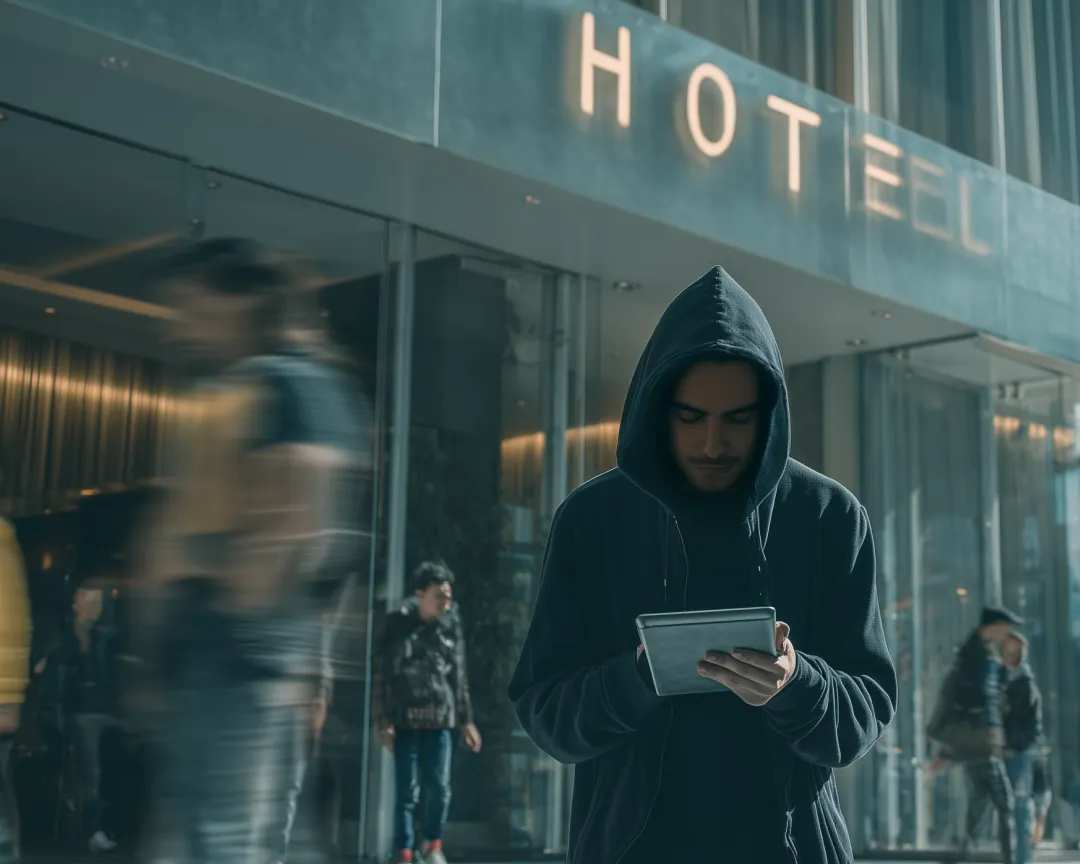.svg)
Hotels with managed security service providers (MSSPs) were 80% more likely to resolve cyber incidents within 12 hours last summer.
That one decision—outsourcing cybersecurity—gave them a decisive edge: Speed. And it made the difference between service disruption and business as usual for hotels, allowing them to contain damage quickly and preserve their guest experience. Now, the stakes are only getting higher.
VikingCloud’s Peak Season, Peak Risk, The 2025 State of Hospitality Cyber Report reveals a troubling trend: Most hotel IT and cybersecurity leaders report a surge in attacks during the summer months, with 66% saying incidents increase and 50% noting they’re more severe.
Last summer alone, 82% of North American hotels experienced a successful breach. And the hits weren’t isolated—58% of hotels were attacked five or more times, and nearly half reported downtime exceeding 12 hours, disrupting operations and eroding trust.
Now, as guests check in for peak season 2025, hotels have once again drawn the attention of cybercriminals. But this time, they’re arriving armed with AI – launching faster, more sophisticated attacks that many internal teams are unprepared to handle. In fact, 48% of hotel IT and cybersecurity leaders admit they lack confidence in their staff’s ability to detect or respond to AI-driven threats like deepfakes.
Against these modern threats, more advanced cybersecurity is no longer optional. It’s foundational to business continuity, guest loyalty, and avoiding brand-damaging service disruptions. Only one question still remains: Can hotels fill their cyber gaps on their own, or is it time to bring in help?
Cybercriminals Are Surpassing Hotel Defenses
Hotel security teams are falling behind, and AI-based cyberattacks continue to rise. This year, 40% of executives reported being targeted by a deepfake attack, up from one-third in 2023. Worse, fraud losses facilitated by generative AI technologies are projected to reach $40 billion in the U.S. by 2027, up from $12.3 billion in 2023—a 32% compound annual growth rate.
Hackers aren’t just going after obscure back-end systems. They’re utilizing AI and other advanced methods to target the very tools guests and hotel staff use every day. The most vulnerable entry points are payment and point-of-sale systems (72%), guest Wi-Fi networks (56%), and front desk operations (36%).
These systems store a wealth of sensitive information, from credit card details and passport scans to loyalty program accounts. If compromised, they could turn a relaxing getaway into a personal data nightmare for hotel guests. In fact, 46% of hotel leaders worry about data breaches exposing payment details, passports, loyalty accounts, or other sensitive guest personally identifiable information (PII).
As AI accelerates the speed and sophistication of cyberattacks, hotels need more than traditional antivirus software—they need well-trained teams, real-time detection capabilities, and proactive strategies tailored to today’s evolving threat landscape.
Lack of Expertise Fuels the Crisis
Many hotel IT and cybersecurity leaders report that their hospitality teams are undertrained and understaffed, with 26% reporting limited in-house cybersecurity expertise and 16% struggling to fill key security roles. As workloads surge during the busy summer travel season, 22% of hotel IT and cybersecurity executives say the added pressure on staff increases the risk of lapses in following established cybersecurity best practices, putting both operations and guest data in jeopardy.
Seasonal staffing adds another layer of concern. Hotels often rely on temporary workers who lack proper cybersecurity training, particularly for sophisticated threats like AI-driven attacks. 26% of hotel leaders report that an influx of seasonal employees unfamiliar with company cyber policies is increasing their organization’s risk this summer. 16% express concern about staff using unsecured or unauthorized software.
Alarmingly, 22% of hotels admit their employees are not regularly trained to recognize or respond to cyber threats, and 16% say they have no plans to implement mandatory or recurring cybersecurity awareness training this summer—if at all. The problem: A hotel’s first line of defense (its workforce) is extremely vulnerable at the exact moment threat levels are rising. The other 2 risk areas to watch include outdated and insufficient technology (40%) and vulnerability in third-party systems like booking engines and guest management platforms (41%).
The True Cost of a Breach
The stakes couldn’t be higher. According to VikingCloud’s new research, hotel IT and cybersecurity leaders report the top 3 consequences they’d face in the 12 months following a successful cyberattack are: (1) Negative online reviews and reputational damage (66%), (2) major financial losses due to recovery costs (46%), and (3) lawsuits or legal liabilities from affected guests (42%). Other ripple effects include declining occupancy rates during the next peak season (32%) and rising insurance premiums (30%).
Most alarming, with the average cost of a hospitality data breach often exceeding $3 million, 1 in 8 hotel IT and cybersecurity leaders say a successful cyberattack this summer could create such severe financial strain that they may be forced to close one or more locations.
Faced with these escalating risks and potentially devastating consequences, hotels are discovering they need more than a 'Do Not Disturb' sign to keep hackers out—and are turning to a proven solution.
Why MSSPs Are Now a Business Imperative
64% of hotels now work with MSSPs—recognizing that internal teams alone can’t manage modern cyber threats.
MSSPs deliver:
- 24x7 real-time monitoring
- Advanced AI-driven threat detection
- Specialized expertise
- Faster incident response and mitigation
And here’s what sets them apart: Hotels with MSSPs are over 80% more likely to resolve cyber incidents within 12 hours—versus days or weeks of costly downtime for others.
That speed makes all the difference in protecting:
- Guest satisfaction
- Brand trust
- Revenue during peak season
Don’t Be the First Stop on a Hacker’s Itinerary
Service can’t stop during peak season, and neither can your security team. MSSPs don’t take time off.
The data is clear: outsourcing cybersecurity isn’t just a smart move—it’s a strategic advantage.
If your teams are overwhelmed, undertrained, or simply outpaced, it’s time to act.
Download VikingCloud’s Peak Season, Peak Risk: The 2025 State of Hospitality Cyber Report
Get an inside look at what’s putting properties at risk—and how MSSPs are helping the smartest hotels recover faster and operate with confidence.





.png)